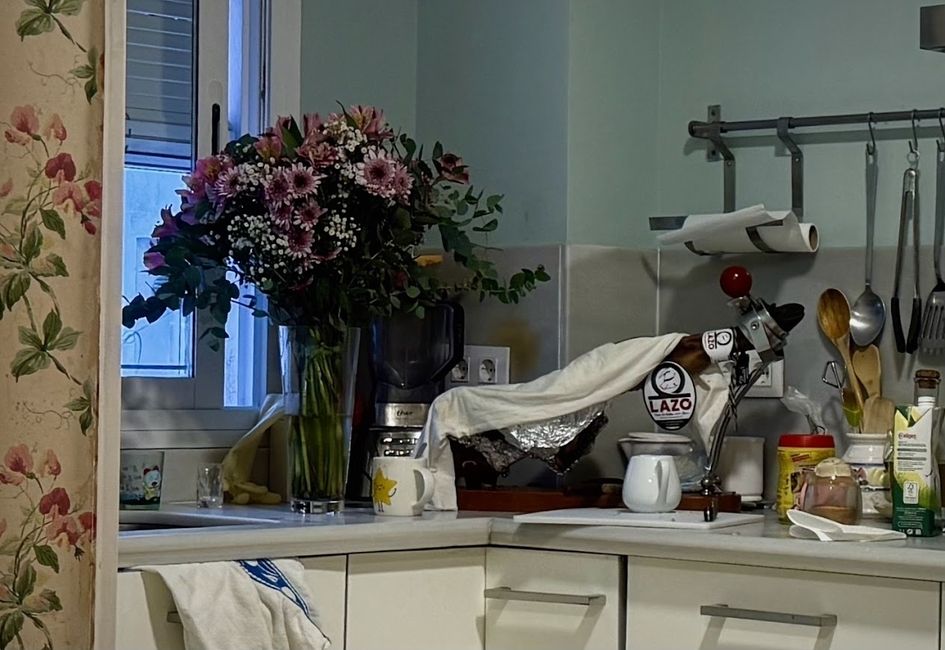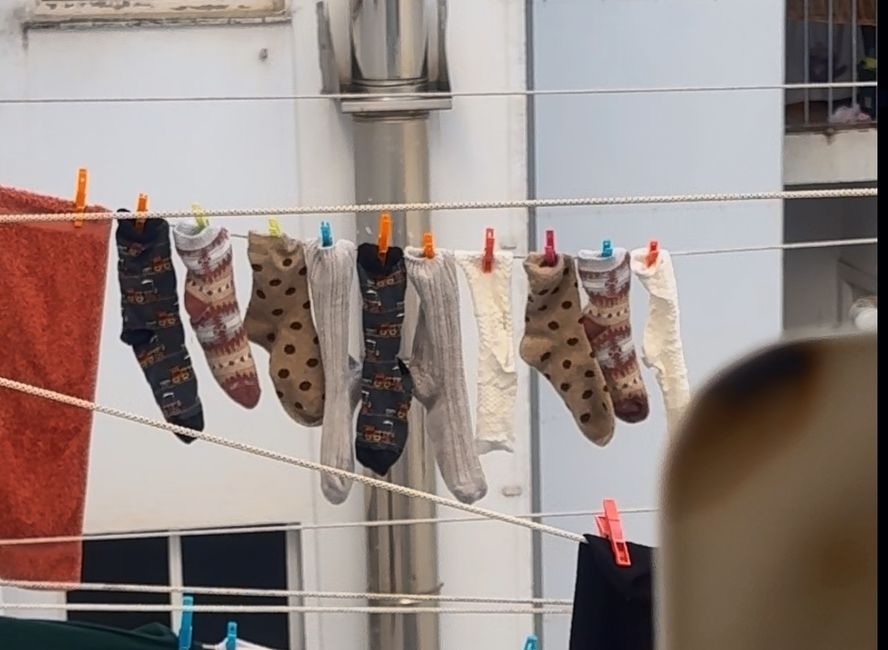Mi Hogar Española
By: Sophia Thrasher
A fifteen-hour travel day into a four-month alternate life is a leap of faith.
As someone who struggles with a sense of belonging, I was fully prepared to tough it out for much of my study abroad experience. I briefed friends and family on my time zone, set up my international calling and texting, figured out video calls to my dad’s stick-in-the-mud Samsung, and did my research on international mail. The theme of my preparation was connectivity— I was prepared to feel like I didn’t belong. So, I did as much as I could to tether myself back to my life in the States. The months leading up to departure are so exciting with shopping, freshly-visaed passports making their slow way home, and getting to know your program mates on social media, but the last few weeks and days are HEAVY with anxiety. My intercultural communication course with CIEE later had us study these feelings of leaving our comfort zone. Our immersion, especially in the language, is a factor of intensity that contributes to the difficulty of a cultural change. I knew so little about what to expect: my language preparedness, my classes, my first few days… but most of all, I was worried about my homestay. I’ve had rotten roommates before. I was so worried to have rotten roommates and a language barrier. I knew nothing but a neighborhood name and a mailing address about the place that would be my home for the next four months, and my host parents had been very dry texters.
CIEE picked me up in a big blue bus at the airport. I was jetlagged and bogged down with four months of luggage and questionable brand-new bangs oilslicked to my forehead. We all chattered with the nervous energy of sleep deprivation and anticipation as the bus jolted through the industrial area near the airport. We ooh-ed and ahh-ed over the impossibly thick loads of oranges in the trees lining the road into Centro.
Most of the students were united with their host families in a small ceremony at the hotel where the bus dropped us. Due to a communication error, my host family wasn't there. CIEE explained all of this in Spanish. After so much travel time, I was overwhelmed nearly to tears. I just wanted to lie down. They called me a taxi and sent a very sweet guide to ride with me to my apartment. Along the way, she and the cabbie pointed out monuments, bars, and other fun places to visit. I’d tour the bars with my culture and cuisine professor and hear his judgments on their authenticity. I’d paint the monuments with my art professor and learn their histories on CIEE tours. I started to calm down and take in the beautiful city. I suspect that they could tell I was freaking out and took a scenic route to give me time to pull myself together.
We pulled up to a bright orange apartment where a little old man was waiting outside. I recognized his scruffy bald head and upside-down smile from our Whatsapp conversation. He greeted me enthusiastically with the typical dos besos and helped me lug my massive duct-taped suitcase into the tiny elevator.
Jetlag is a brutal, brutal beast. I moved into my homestay completely unable to speak Spanish. Seven years of travel and study were totally gone. I remember my host dad explaining to me that eggs are a dinner food as he made me a welcome-home breakfast tostada with olive oil and jamón sliced fresh off the massive leg on the kitchen counter. I remember my host sister explaining how the shower worked in what could easily have been total gibberish. I remember a devastatingly deep nap that lasted pretty much all day. After that, I started to get my brain back.
I met my host mom that afternoon as she came home from work as a teacher at a local colegio or elementary school. Thank God I could speak Spanish again! I was giddy to be able to actually talk to these alien exotic Spanish people! I was so cool! They told me my Spanish was so good! They fed me cordon bleu and sausages and pico breadsticks! I went to bed after a 9:30 dinner (they were easing me into Spanish mealtimes) still exhausted, but content. These people were not alien and exotic. They were not rotten roommates.
In fact, they have been incredible roommates. We eat 2-3 meals together every day and spend each one chatting. They gently correct my Spanish and I learn from it. I tell them about what I’m studying in Spain and what I miss at home, and they act genuinely interested. My host dad in particular never runs out of questions on everything from baseball to health insurance.
They’re always ready to answer questions, even weird ones. For my intercultural communication CIEE course, I had to select a compañero cultural, someone to discuss Spanish culture and experiences with. I chose my 23-year-old host sister. She never backs down from a homework conversation, no matter how weird the prompts get. I just have to make sure my homework doesn’t interrupt her viewing of Sevilla FC!
Through every little conversation and interaction, we’ve gotten closer. When they invited me to come to a meal with their family and friends for my host sister’s birthday party, I really felt like a member of the family. When my host sister then invited me to the club with all of her friends, I felt like a friend. When I had to go home more than 5 hours before their group because I was up later than I’d ever been, I felt like an American. The next day, over a 15:30 lunch of cod and spinach soup (try that after a long night out!), we all recapped the night together and they giggled when I told them that a night out in South Carolina rarely lasts past 1 AM. “In Spain,” they told me, “nightlife is our life.”
My placement was incredibly lucky. With my roof access, I can see the river and the Cathedral. From my balcony, I can peoplewatch a café/bar. On my walk to class, I can pet a wonderfully well-behaved dog at his post in front of his dad’s barbershop. For Fería, my host mom offered me my pick from years and years of flamenco dresses from three daughters. When I got sick, my retired pulmonologist host dad checked me out.
My home away from home is so special to me, and my host family has made it so. I’ll always carry fond memories of my pink bedspread turning gold at sunset and my horrendous child’s desk that was definitely co-opted from the colegio. I’ll miss hours of sobremesa and fútbol tucked into our heated table and springing up from it to take pictures of the moon over La Giralda. I’ll miss making my American breakfast on Saturdays and startling my host dad as he cooks with his AirPods in. I’ll miss taking my daily fit check in the tiny mirrored elevator.
Spanish has two words for home: Casa y Hogar. Generally, casa means house. It’s the physical space for living. Hogar has come to mean home. Its literal meaning is hearth; the place where you build your fire. As I learned in my culture and cuisine course with CIEE, fire was the first community builder. When paleolithic era humans in the Iberian Peninsula discovered the use of fire, it forced them to put down roots. A hearth takes stoking. It takes maintenance. It takes people who care to keep it going. My homestay is a hogar. My host family cares and keeps me going.
Related Posts
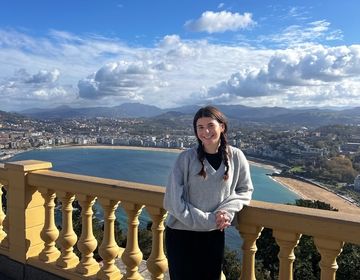
Fluent in Life: Lessons from Studying Abroad in Spain
By: Gabby Watts Growing up, my mom would always tell me stories about her year studying abroad in London. She raved about the experience and how much it taught her... keep reading
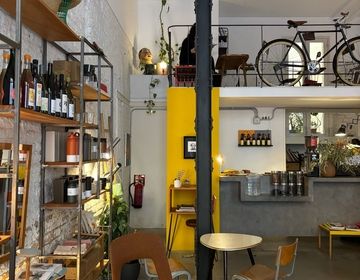
My Top Five Cafes in Madrid
By: Gabby Goldstein As a student with very limited time here in Madrid, I love to take advantage of the various culinary opportunities this city has to offer. Above all... keep reading
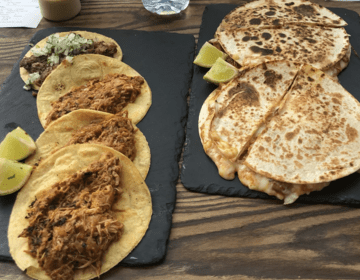
Birney Sherard’s Madrid Food Blog
By: Birney Sherard As a reformed picky eater, while studying abroad in Madrid through CIEE this past semester, I have committed myself to expanding and advancing my palate. Below, I... keep reading
